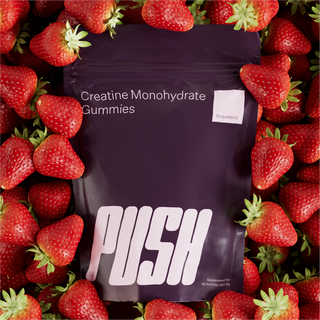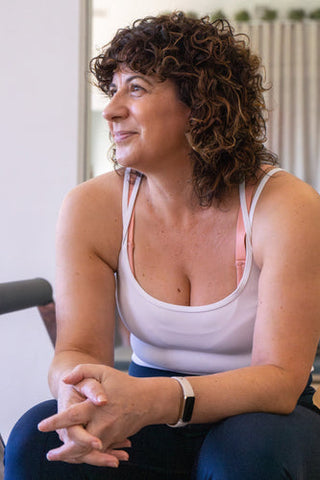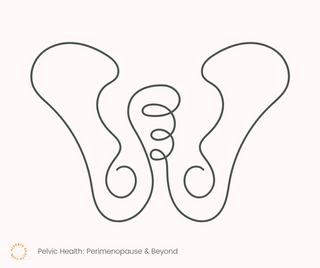Welcome to our Women’s Pelvic Health series!
Here at Aleenta, we move beyond cool Pilates choreo (although that is also super fun). We are educators at heart.
Our teaching team includes some highly skilled individuals, including physiotherapists, naturopaths and doulas – and we've joined forces with one of them to bring you crystal clear info on common pelvic health changes, challenges and conditions.
Meet respected (and super brilliant) Adelaide women’s health physiotherapist Ellie Parnell, of Glide Physio & Pilates.
“All exercise has some impact on your pelvic health – some beneficial and some harmful, depending on your unique physiology,” Ellie says.
“Certain conditions or life stages can increase your risk of developing pelvic health problems.
“We want to help you understand your pelvis so you know what is normal and healthy, and when you might need to adjust what you're doing and get professional advice.”
Research shows it's not just exercise that impacts your pelvic health, but it works in reverse as well.
"Your pelvic health impacts your ability – and inclination! – to exercise and remain strong and flexible as you move through life," says Ellie.
Poppin’ a few key pelvic health ins & outs in your mind helps you adjust your movement intuitively when things feel not-quite-right, and guides your judgement on when to see a professional if you’re concerned.
We got info on:
-
Pelvic health: its relationship with exercise
-
Anatomy and physiology: how being curious about your biomechanics helps you get the most out of exercise
-
When something is weird: how finding help for pelvic health issues (although it can feel tricky) can enhance your overall health
-
Work with what you got: managing common issues through different seasons of life and/or chronic conditions

If you’re reading this, you probably have a pelvis.
Often known as the “hip” bones, this basin-shaped structure is more complex than you think.
“Your muscles and organs are intricately linked with the chemical (hormone) changes your body cycles through daily, monthly and beyond,” says Ellie. “This impacts your energy levels, organ function, physical fitness and psychological well being, every day.”
Common Pelvic Health life cycle changes, issues and conditions can include:
-
conception & pregnancy
-
menopause
-
pain during sex and/or low libido
-
general pelvic pain, discomfort or heaviness
-
lower back pain
-
pelvic organ incontinence and/or prolapse
-
aches or stabbing pain during your period
-
heavy and/or irregular bleeding
-
polycystic ovaries
-
overactive or weak pelvic floor muscles
-
constipation, irritable bowel, and/or nausea
-
issues with urination
-
endometriosis and adenomyosis
-
chronic tension, strain and pain in joints and connective tissue

How do situations like menopause or constipation connect to my 'pelvic' health?
One thing you’ll notice is that we describe the body in compartments so that we’re all clear about what’s being discussed, but your body’s chemical, digestive, filtration and reproductive systems are intimately connected by nerves, fluid, fascia and muscles!
According to Ellie, big changes to your reproductive cycle like menopause or ongoing intestinal issues affect organs housed within your pelvis, which has a flow-on effect through the whole pelvic region.
I want to look into my pelvic health issues – where do I start?
Are you ready to control your own health, put your mind at ease and feel better? Book a consult or assessment with Ellie Parnell here
Whether you're navigating motherhood, reducing incontinence, experiencing changes during menopause, or simply want to prioritise your pelvic health, a physiotherapist can:
- investigate your symptoms / assess your strength with methods including ultrasound
- help you manage symptoms & treat conditions (or refer you on the relevant practice, including radiology & GP) through a range of techniques, including massage, mobilisation, dry needling, targeted exercises, and clinical Pilates
- support your goals to stay fit, strong and healthy
Glide Physio & Pilates is located at Aleenta Health Club, 421 Magill Rd, St Morris (opposite Skala Bakery).
Aleenta members – mention this blog to get 20% off your initial appointment.
NEXT UP
Pelvic Health: Anatomy & Physiology
Pelvic Health: Muscles & Fascia
Ellie Parnell, Glide Physio & Pilates








